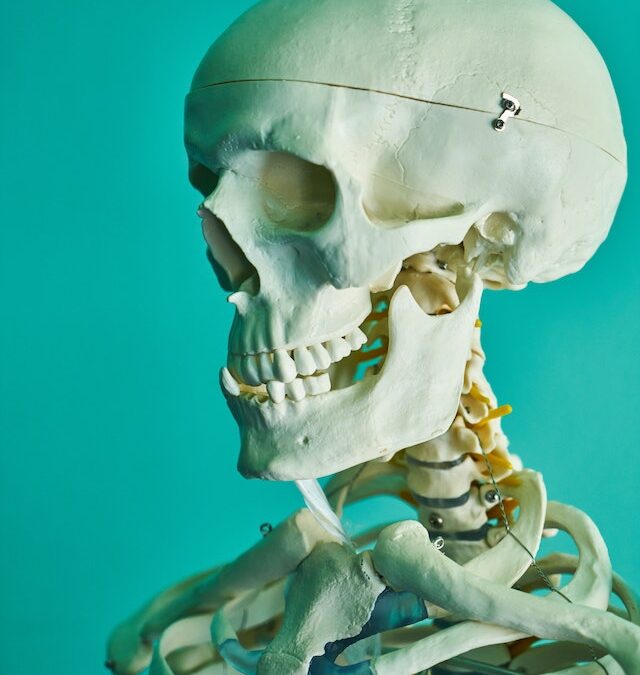
by Tanya Keam | May 10, 2023 | Acupuncture, Chinese medicine, Client information, Health practitioner, Jaw pain, Mental health, Muscle pain, Nambour, Private health, Rehabilitation, Sleep, Stress, Sunshine coast, TMJ, Wellness
Acupuncture for TMJ
What is TMJ?
TMJ stands for Temporo-Mandibular Joint. The TMJ is the joint that connects the jaw to the skull. These joints are involved in eating, facial movements and speech. Let’s get into how Acupuncture for TMJ pain can be helpful.
What is TMJ pain?
Pain that can feel grinding in the jaw, that if left untreated can lead to inability to chew properly, ear pain, migraine, headache, lack of sleep, tooth pain, lockjaw, dizziness, anxiety and joint noises such as cracking or popping of the jaw.
What are the symptoms you might experience from TMJ pain?
- Inability to chew food properly
- Ear pain or ear ache
- Insomnia
- Tooth ache
- Locked jaw
- Headache
- Migraine
- Mood dosorders
- Neck pain
- Dizziness
- Vertigo
How can TMJ be diagnosed?
Diagnostic tests may include:
- Xray
- MRI
- CT scan
- Physical exam by a general physician, physical therapist or other allied health professional if you are presenting with persistent jaw pain
Available treatment options for TMJ pain
- Exercises to relax or strengthen the muscles of the jaw
- Dental splints to reduce tooth grinding at night
- Dental alignment
- Stress management
- Soft tissue release to relax muscle tension in the jaw
- Diet changes such as increasing omega’s to reduce systemic inflammation such as arthritis, autoimmune or connective tissue conditions
- Pharmaceutical pain relief
- Herbal medicine
- Acupuncture
- Physical therapy
By the time a person seeks treatment, TMJ is often at its chronic stage so it does take time to treat it and using more than one type of approach would give a person a better outcome.
For example: managing stress so that a person does not grind their teeth at night thus reducing the need for a dental splint, improving diet to align with low to no inflammation in the body and seeking treatment from a qualified therapist to assist soft tissue release such as having acupuncture or having dental procedures to correct jaw and tooth alignment.
Acupuncture for TMJ:
Acupuncture therapy has been around for centuries and is often known to be able to treatment painful conditions. Aside from dental causes of TMJ, the majority of cases can be seen as a deep route of underling stress which therefore causes tension on the neck, jaw and temporal muscles of the skull. Exacerbated tension leads to exacerbated pain. The added benefits of chinese herbal medicines, diet and lifestyle advice alongside the acupuncture therapy, people can have lasting results in treating TMJ.
Current research findings for Acupuncture for TMJ:
- Acupuncture to have a positive effect in the treatment of pain associated with TMJ compared to the control groups (3).
- A 2010 study showed acupuncture treatment of TMJ achieved immediate effect in pain and showed ongoing positive effects after a treatment regime over 8 – 10 weeks of treatment (1).
- A 2012 study showed pain intensity was less in the trigger point acupuncture group than in the sham (fake acupuncture) treatment group, pain intensity decreased significantly between pretreatment and after 5 weeks, and trigger point acupuncture therapy may be more effective for chronic TMJ myofascial pain (2).
- A 2014 study showed laser acupuncture therapy improves the symptoms of treatment-resistant TMD. Further studies with a more appropriate designs specific for laser acupuncture are needed (5), however a review of acupuncture randomised control trials (3) found acupuncture showed promising results in the management of TMJ symptoms (4).
If you are suffering from TMJ pain please contact us today to discuss how we can help you at our Nambour Acupuncture clinic in the Sunshine Coast hinterland.
Hi, I’m T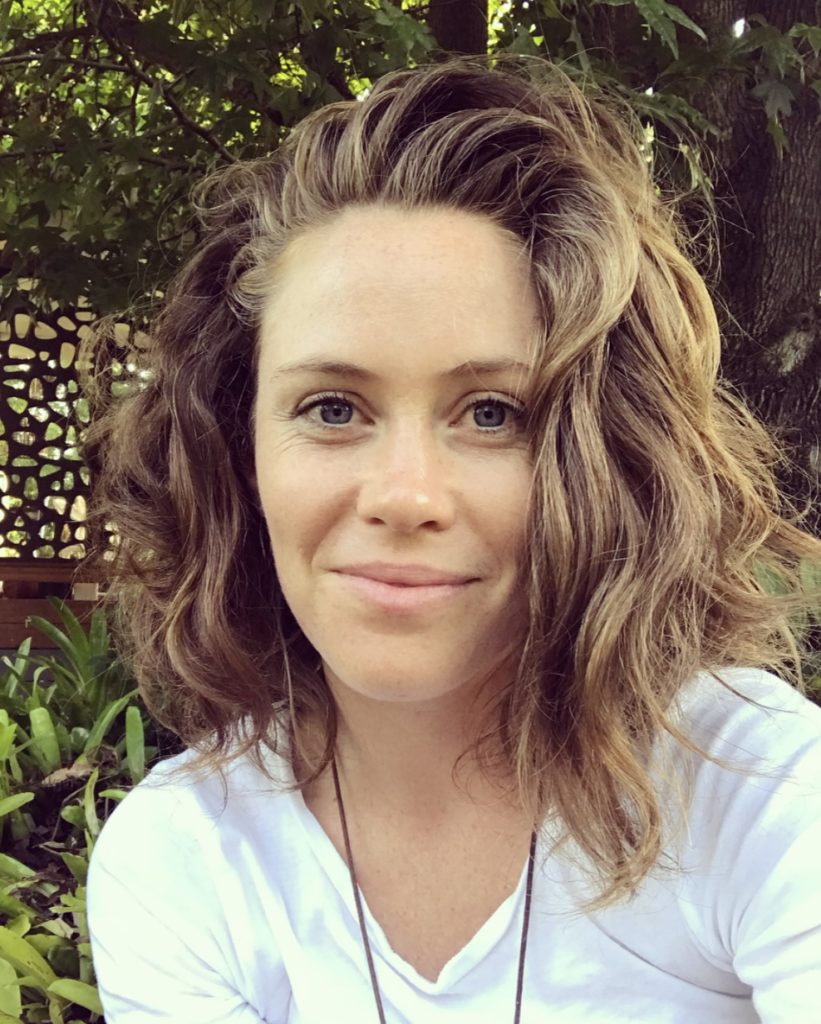 anya, an AHPRA registered Acupuncturist and health practitioner in Nambour in the Sunshine Coast hinterland, Queensland Australia. I practice Chinese medicine because its safe, logical, relevant and has effectively shown methods of natural wellness for thousands of years (read more about my training here). Life doesn’t need to be complicated and nor does the treatment approaches to get people feeling vibrant and well. I’ve seen people gain a lot from treatments, much more than just alleviating symptoms. It’s exciting to connect with people and share deep wisdom from the classics of ancient and traditional medicine, with modern protocols for todays mind-body living. See you in the clinic !
anya, an AHPRA registered Acupuncturist and health practitioner in Nambour in the Sunshine Coast hinterland, Queensland Australia. I practice Chinese medicine because its safe, logical, relevant and has effectively shown methods of natural wellness for thousands of years (read more about my training here). Life doesn’t need to be complicated and nor does the treatment approaches to get people feeling vibrant and well. I’ve seen people gain a lot from treatments, much more than just alleviating symptoms. It’s exciting to connect with people and share deep wisdom from the classics of ancient and traditional medicine, with modern protocols for todays mind-body living. See you in the clinic !
References :
- Acupuncture for Treating Temporomandibular Disorder: Retrospective Study on Safety and Efficacy: Garty Adriel, Maimon Yair, Miller Udi; Acupunct Meridian Stud 2010
- Effects of trigger point acupuncture treatment on temporomandibular disorders: a preliminary randomized clinical trial: Kazunori Itoh, Sayo Asai, Hideaki Ohyabu, Kenji Imai, Hiroshi Kitakoji; Epub 2012
- Acupuncture therapy in the management of the clinical outcomes for temporomandibular disorders A PRISMA-compliant meta-analysis: Jun-Yi Wu, MD,Chao Zhang, MD, Yang-Peng Xu, MM, Ya-Yu Yu, MD,Le Peng, PhD, Wei-Dong Leng, PhD,Yu-Ming Niu, PhD, and Mo-Hong Deng, PhD
- Acupuncture for Temporomandibular Disorders: A Systematic Review: Seung-Hun Cho KMD PhD, Wei-Wan Whang KMD PhD.
- Clinical effectiveness of laser acupuncture in the treatment of temporomandibular joint disorder: Yu-Feng Huang, Jung-Chih Lin, Hui-Wen Yang, Yu-Hsien Lee, Chuan-Hang Yu; Epub 2014
- https://www.mayoclinic.org/diseases-conditions/tmj/symptoms-causes/syc-20350941
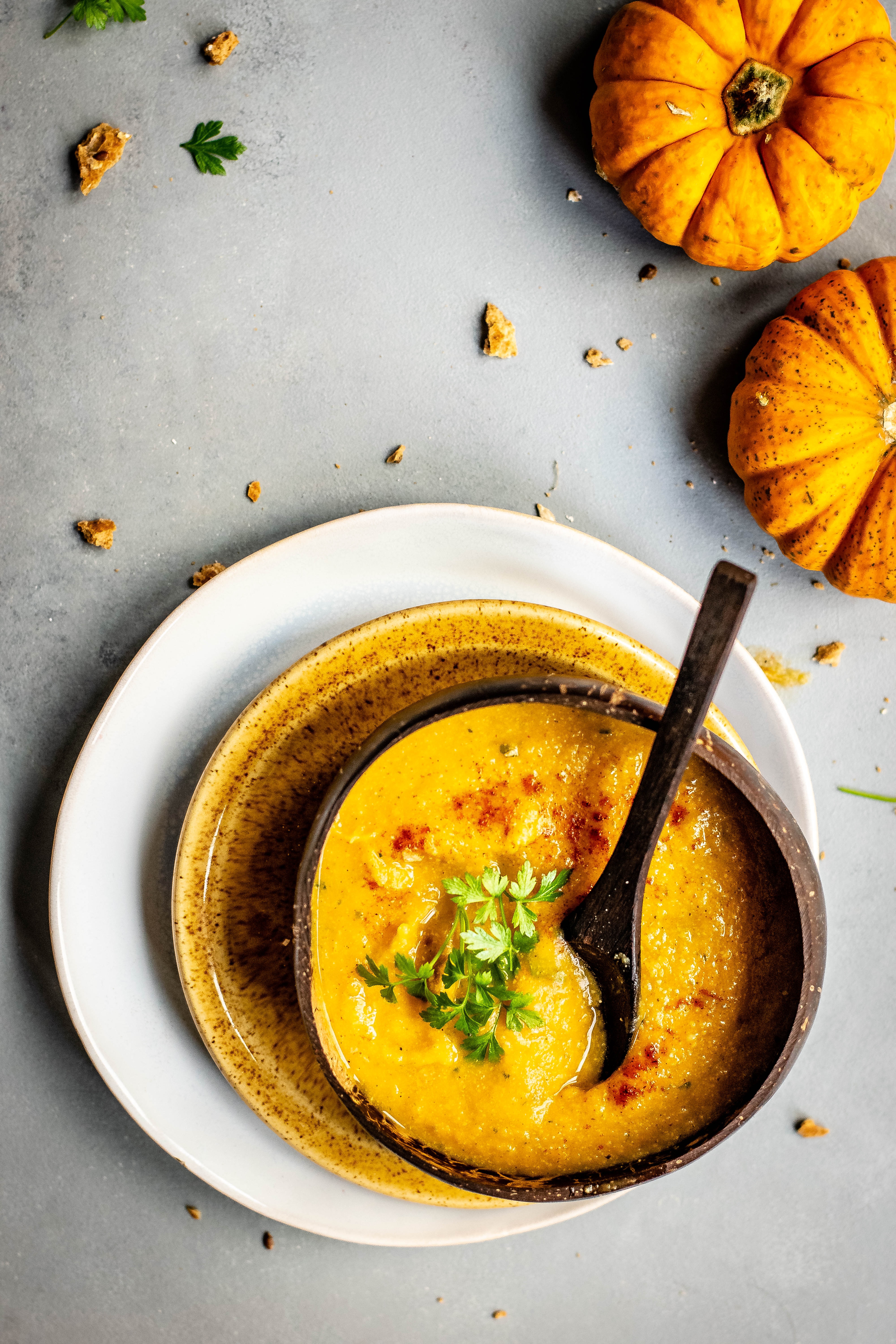
by Tanya Keam | May 2, 2023 | Acupuncture, Autoimmune, Bloating, Chinese medicine, Chronic fatigue, Client information, Digestive health, Health practitioner, Herbal remedies, IBS, Immune system, Inflammation, Loose stools, Nambour, Nourishing, Seasonal living, Sunshine coast
Digestive health in Chinese medicine is determined by the digestive symptoms we experience. The way food is prepared and cooked affects how we absorb nutrients. Our energy level, mood, body shape and muscle mass, flavour cravings, gyneocological problems and bowel movements tell us important information. Research is now suggesting a link between the gut-brain connection with conditions like Irritable Bowel Syndrome (IBS) (1) and the effects of our mental health and stress levels impacting our gut health. From a Chinese medicine point of view the way humans can overthink and worry in the mind, directly affects the digestion. Science is just now catching up with digestive health in Chinese medicine.
In Chinese medicine, a lot of emphasis is on the energetics of the spleen organ. What does the spleen do? Its job is to digest food, coagulate blood and metabolise fluid in the body. In other words, transform food and water into energy and then transport that energy around the body to make everything our body is made up of such as blood cells and muscle.
Because our core body temperate ranges from 35.9 to 37.2, the spleen does a much better job when cooked foods are eaten. Like our tummy is a nice warm cauldron. Having an icy cold smoothie, cold breakfast and cold water throughout the day make the spleen work harder by first using energy to warm up whats been ingested, then ‘transform and transport’. Going from a 19 degree fridge temperate (or even colder if you’re eating something frozen, to a 36.5 degree stomach temperature!) So its doing double the work! Symptoms that can arise are fatigue, bloating, excessive sweet cravings, soft and/or loose stools, poor muscle tone and deficiency of minerals and nutrients due to poor absorption.
It’s not to say every meal we have needs to be cooked. But a warm cooked breakfast such as eggs or oats, starts your day off well by keeping you fuller for longer (protein makes you feel fuller so daily eggs are a good option). Salads and raw fruit is still important to consume for vitamins and minerals but ease off on them in the cooler months, or have the salad at room temperature.
Cauldrons of soups, pots of fragrant teas, bowls of steaming rice and slow cooks stews are your best friend in the cooler months because no vitamins or minerals are lost in the cooking methods (like when steaming or blanching vegetables). Instead, all of the nutrients stay in the liquid. Warm meals keep us well and energised.
For people who cannot stomach food in the morning, this is due to the stress hormone cortisol being too high. Adrenaline kicks in when you wake up to get you going for the day because Cortisol is highest first thing in the morning. Often reaching for a coffee on an empty stomach stimulates adrenaline further and people live in this cycle of cortisol – adrenaline. If you have a job where getting up at 3.30am is your day, then you’re not going to be hungry because you’re body is suppose to be still asleep, but come 6-7am your stomach should be telling you to eat something by then. If you really do enjoy a morning coffee, aim for mid morning and have food with it so the caffeine isn’t triggering adrenaline and cortisol.
Ideally, waking up to hydrate with room temperature to warm water, then eat a warm breakfast between 7-9am is best for our digestive health in Chinese medicine theory. The spleen energy kicks in from 9-11am to do its T & T function. With daily exercise, daily bowel movements should be well formed and feel complete. If you need to wipe your bottom a lot or theres quite a lot of smell or mess in the toilet are you flush – your spleen is under-fuctioning like there is a “stickiness” in your stools. In Chinese medicine we call this dampness. Acupuncture and herbal medicine can quickly harmonise this. On the other hand if you’re bowels are irregular or sluggish then the body is absorbing waste back into the body – this can lead to liver problems and further bowel problems. Research has also shown that the warm therapeutic effect of moxibustion (burning compressed mugwort on or near a person’s skin) to help alleviate various conditions involving pain and discomfort, including IBS, showed moxibustion may also provide a benefit to IBS patients in 20 randomised-controlled trial results (2).
If you are suffering from digestive symptoms mentioned above or you believe you have poor digestion, have been diagnosed with inflammatory bowel, IBS or you’re aware stress and emotions are upsetting your stomach, please contact us today to discuss how we can help your digestive health at our Nambour Acupuncture clinic in the Sunshine Coast hinterland.
Hi, I’m T anya, an AHPRA registered Acupuncturist and health practitioner in Nambour in the Sunshine Coast hinterland, Queensland Australia. I practice Chinese medicine because its safe, logical, relevant and has effectively shown methods of natural wellness for thousands of years (read more about my training here). Life doesn’t need to be complicated and nor does the treatment approaches to get people feeling vibrant and well. I’ve seen people gain a lot from treatments, much more than just alleviating symptoms. It’s exciting to connect with people and share deep wisdom from the classics of ancient and traditional medicine, with modern protocols for todays mind-body living. See you in the clinic !
anya, an AHPRA registered Acupuncturist and health practitioner in Nambour in the Sunshine Coast hinterland, Queensland Australia. I practice Chinese medicine because its safe, logical, relevant and has effectively shown methods of natural wellness for thousands of years (read more about my training here). Life doesn’t need to be complicated and nor does the treatment approaches to get people feeling vibrant and well. I’ve seen people gain a lot from treatments, much more than just alleviating symptoms. It’s exciting to connect with people and share deep wisdom from the classics of ancient and traditional medicine, with modern protocols for todays mind-body living. See you in the clinic !
References:
- Harvard Health Publishing (2018). ‘The gut-brain: connection. At: ’https://www.ncbi.nlm.nih.gov/pmc/articles/PMC6111498/
- Mayo Clinic (2018). “Irritable Bowel Syndrome”. At: https://www.mayoclinic.org/diseases-conditions/irritable-bowel-syndrome/symptoms-causes/syc-20360016
- https://bmccomplementmedtherapies.biomedcentral.com/articles/10.1186/1472-6882-13-247#Sec7
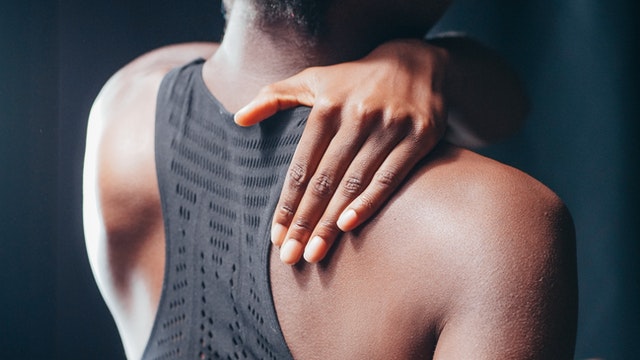
by Tanya Keam | Jan 17, 2022 | Acupuncture, Chinese medicine, Client information, Frozen shoulder, Health practitioner, Muscle pain, Nambour, Shoulder pain, Sunshine coast, Uncategorized
Frozen shoulder Acupuncture and other treatment options
The shoulder can rotate in a full circle, unlike the elbow that only bends one way. Frozen shoulder is much like the name suggests. There is no movement or very limited movement in the shoulder capsule joint or the whole shoulder itself, it is frozen stuck. It can be quite painful as any slight attempt to move the shoulder joint or raise the arm, results in sever pain and restriction. If left untreated, it can lead a to a chronic condition. Below is further information of what causes it and frozen shoulder acupuncture treatment and other therapy options.
What is Frozen shoulder
Adhesive capsulitis (any word with the word ‘itis’ means inflammation) which is a shoulder condition that results in restriction and pain on range of motion. The muscles and tissues in your shoulder joint over time can become thicker and tighter leading to damage and scar tissue forming. As a result, the shoulder becomes restricted and extremely painful to move, to lay on and to even sleep.
What are the symptoms and stages of a Frozen shoulder
- The beginning stage is where the pain begins. We naturally try to avoid pain by reducing the arm movement and range of motion of the shoulder joint to stop the pain. Further inflammation and swelling can also result in reducing the amount of whole arm movement. Pain can feel dull, achy, sharp and worse on movement.
- The second stage is when the shoulder becomes frozen. Pain may even reduce however the joint becomes more difficult to move and is now stiff. For some people, the pain worsens at night, sometimes disrupting sleep.
- The last stage is when inflammation and swelling reduce in the shoulder capsule and the surrounding muscles, tendons and ligaments have more room to move more freely. Blood flow is also moving better so the range of motion beings to improve.
What can cause a Frozen shoulder
The bones, ligaments and tendons that make up your shoulder joint are encased in a capsule of connective tissue. Frozen shoulder occurs when this capsule thickens and tightens around the shoulder joint, restricting its movement (1).
It is sometimes not clear why this swelling occurs but can be linked to excessive use of the shoulder such as hyper-extending the joint, tearing of the tendons and muscles that support the shoulder structure or those who recently had to immobilise the shoulder for a long period, such as having it in a sling after surgery or an injury.
Frozen shoulder can be more common in:
- People 40 and older, particularly women
- People who’ve had prolonged immobility or reduced mobility of the shoulder
- People suffering from Diabetes, Parkinson’s disease, thyroid imbalance or cardiovascular disease
- People recovering from a stroke
What are some ways to help a frozen shoulder recover
- Decreasing pain first so a person can at least sleep properly to rest and recoup the body. Conventional medicine will offer use of anti-inflammatories and general pain relievers that offer temporary solutions. Steroid injections directly into the joint may be offered in some cases to attempt to reduce inflammation locally in the shoulder. There are some risks associated with traditional pain management.
- Increasing range of movement needs professional guidance so that the shoulder is not made worse or to push to the point of pain. If done incorrectly, pain and inflammation will cause further problems and restriction of movement – it may seize up. Exercises can be helpful to increase this range of movement.
- Acupuncture has been found in numerous research trials to have a strong impact and positive effect in pain reduction and improvement in shoulder mobility for frozen shoulder (2). Immediate and long lasting effects in the reduction of pain (3) is ideal as we want the shoulder to recover completely, not just have short term symptomatic relief that a pharmaceutical might provide.
- Mobilising the joint manually and massage therapy can help to loosen the tight muscles which improves movement and reduces pain. it is extremely important that this therapy is done gently so that too much pressure doest aggravate the condition.
- Surgery is usually considered as the last possible option after the above approaches have been applied, but may sometimes be necessary when the shoulder has damage to the muscle or tendons. Scans can be helpful to determine if surgery is even an option.
if you’re experiencing Frozen shoulder or other painful conditions, get in touch today to see if Acupuncture and other therapies used within our clinic may be of help to you. Contact Us or Book Online.
 Hi, I’m Tanya Keam,
Hi, I’m Tanya Keam,
an AHPRA registered Acupuncturist, bodyworker and doctor of Chinese medicine in Nambour in the Sunshine Coast hinterland, Queensland Australia. I practice Chinese and natural medicine because its safe, logical, relevant and has effectively shown methods of natural wellness for thousands of years (read more about my training here). Life doesn’t need to be complicated and nor does the treatment approaches to get people feeling vibrant and well. I’ve seen people gain a lot from treatments, much more than just alleviating symptoms. It’s exciting to connect with people and share deep wisdom from the classics of ancient and traditional medicine, with modern protocols for todays mind-body living. See you in the clinic !
References
- The mayo clinic: symptoms and causes: https://www.mayoclinic.org/diseases-conditions/frozen-shoulder/symptoms-causes/syc-20372684
- The Effectiveness of Acupuncture in the Treatment of Frozen Shoulder: A Systematic Review and Meta-Analysis, September 2020, Eyal Ben-Arie, Pei-Yu Kao, Wen-Chao Ho, Yu-Chen Lee, Evidence-based Complementary and Alternative Medicine2020(3):1-14.
- Immediate Pain Relief in Adhesive Capsulitis by Acupuncture: A Randomized Controlled Double-Blinded Study, Sven Schröder, MD, Dr. med. (PhD), Gesa Meyer-Hamme, MD, Thomas Friedemann, PhD, Sebastian Kirch, cand. med., Michael Hauck, MD, Dr. med. (PhD), Rosemarie Plaetke, PhD, Sunja Friedrichs, cand. med., Amit Gulati, PhD, Daniel Briem, MD, Dr. med. (PhD), Pain Medicine, Volume 18, Issue 11, November 2017.
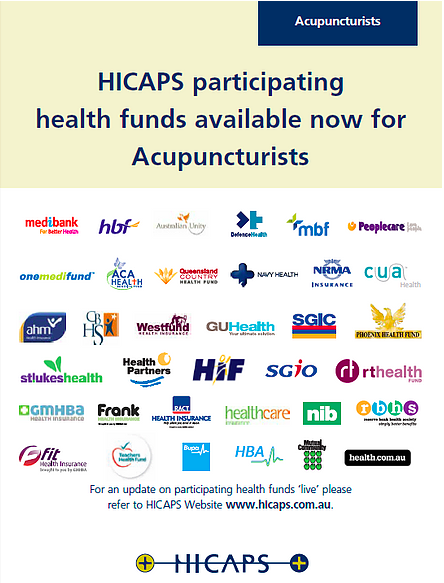
by Tanya Keam | Sep 23, 2021 | Acupuncture, Chinese medicine, Client information, Health practitioner, Private health
Private Health for Acupuncture
Health Fund Changes Since 2019
Has there been private health fund changes?
There has been some changes to the private health insurance legislation. As of April 1, 2019 changes surrounding health fund rebates for complimentary therapies and natural medicine have commenced. You might be wondering if your favourite and preferred complimentary medicines have been excluded or not. The good news is, Private health for Acupuncture and Chinese medicine have not been affected by the change. They will continue to be listed under therapies with private health fund status.
Will I be able to claim benefits for Acupuncture from a qualified Chinese Medicine practitioner from my private health fund?
Yes! Acupuncture and Chinese Medicine have maintained their private health fund status. Depending on the type of private health insurance cover you have and are limited to, will determine how your health fund provider reimburses you. Tanya Keam would recommend you speak to your current health fund provider to ensure your current policy covers all that you need, such a hospital cover and the extras that you actually use. You may not need optical or dental as a extra for example. Your fund will ensure you have selected specific extras cover option that includes Acupuncture and Chinese Medicine.
What therapies HAVE BEEN affected by the changes?
The federal government has made a decision to no longer allow health fund providers to issue rebates for a number of natural therapies. These include:
- Alexander Technique
- Aromatherapy
- Bowen Therapy
- Buteyko Breathing technique
- Feldenkrais
- Homeopathy
- Iridology
- Kinesiology
- Naturopathy
- Pilates
- Reflexology
- Rolfing
- Shiatsu Massage
- Tai Chi
- Western Herbalism
- Yoga
How can I claim my private health insurance at Tanya Keam’s Clinic?
Tanya Keam’s Sunshine Coast Acupuncture Clinic has a health fund provider HICAPS terminal on site to facilitate your health fund transactions. You can then pay the gap amount via eftpos, credit card or cash – meaning you don’t need to follow up your rebate afterwards. You can find which health funds are available for on the spot claims here. Rare occasions when health funds or terminals are down, you will receive an invoice via email that you can send a PDF document straight to your health fund for reimbursement. How much you get back from your private health fund for Acupuncture and Chinese Medicine depends on your individual policy and the level of cover your health fund provides, such as a 50% rebate or a 20% rebate. Health funds will also be able to let you know what your limit is for the entirety of your policy year round, such as $400 or $1000 per year. Policies are usually a calendar year or financial year start date.
Patients often ask who is the best health fund to go with. That question is really something you and your family need to sit down and go over, depending on the level of cover you want and the premiums you want to pay to insure your health privately. Rebates can also only be obtained when you attend your booked appointment and your Acupuncturist has treated you. If for example you are sick or miss the appointment, the practitioner cannot issue you an invoice to claim despite the practitioners own treatment costs.
 If you have any further questions about private health rebates for your treatments then please contact us here or book online here.
If you have any further questions about private health rebates for your treatments then please contact us here or book online here.
Tanya Keam Wellness is a Chinese Medicine, Acupuncture and Natural Health Clinic in Nambour Heights, in the beautiful Sunshine Coast Hinterland in Queensland. Tanya welcomes her patients into the clinic with compassion and and open mind, while understanding their desired outcomes for current ailments and life-long optimal health. Her particular interest is in women’s health and fertility, pain, the immune system, mental health and preventative medicine. With continued training, Tanya works closely with patients from a integrative perspective by blending evidence-based healthcare with traditional eastern medicine.
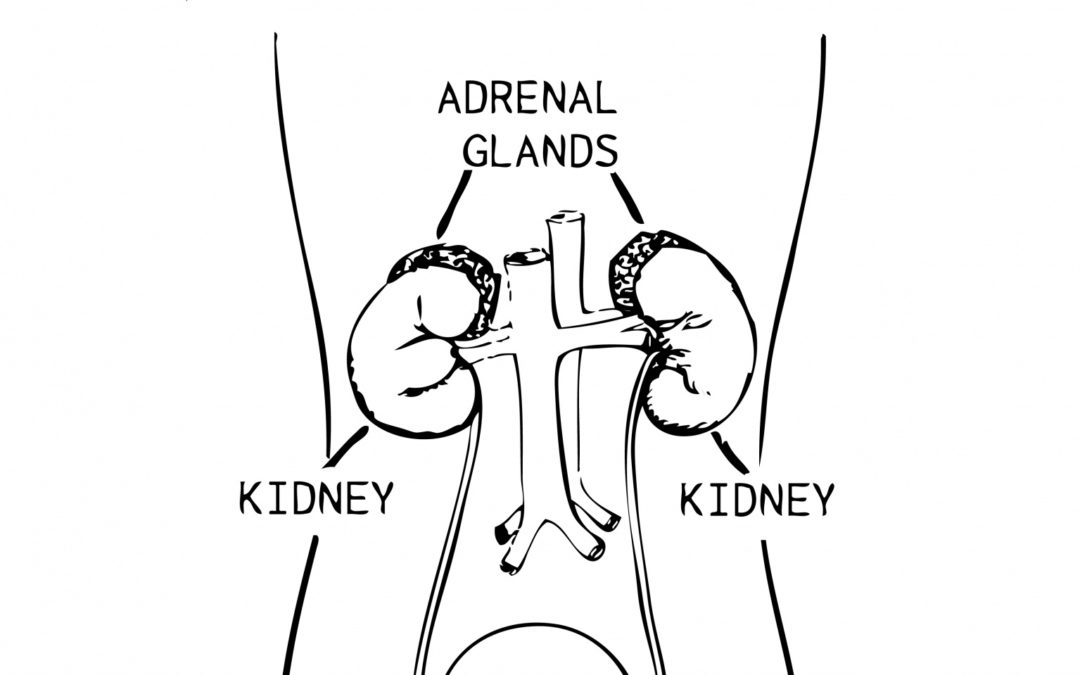
by Tanya Keam | Apr 6, 2021 | Acupuncture, Adrenal burnout, Adrenal Fatigue, Chinese medicine, Chronic fatigue, Client information, Daily Rituals, DIY Wellness Tips, fertility acupuncture, Health practitioner, Mental health, Nambour, Sunshine coast
What is Adrenal Fatigue?
The Adrenal glands belong to the Endocrine System where they produce a variety of hormones that are essential to life. The medical term “Adrenal Insufficiency” is an inadequate production of one or more of these hormones as a result of underlying conditions. Whereas, Adrenal Fatigue isn’t an accepted medical diagnosis, it is thought that adrenal fatigue is caused by stress on the body where the adrenal glands cannot cope with the constant pace of fight-or-flight (sympathetic) nervous system response. adrenal fatigue acupuncture sunshine coast
tSigns and symptoms of adrenal insufficiency:
- Fatigue
- Body aches
- Unexplained weight loss
- Loss of body hair
- Skin discolouration
- Lightheadedness
- Low blood pressure
- Low production of hormones
Diagnosis for adrenal insufficiency can be tested to show inadequate levels of adrenal hormones.
In Traditional Chinese Medicine, adrenal fatigue is burnout. The kidney is the organ that stores our vital energy called Qi. We are all born with varying amounts of energy based on genetics, this is called out ancestral energy. This energy manages our reproduction, ageing, vitality and emotional-physical endurance. The day to day living of healthy food, exercise, relationships, environment and work/life balance is what maintains the kidney energy.
The less ancestral and vital kidney force you have (based on your lifestyle and if you’re over doing it), the sooner the chance of adrenal burnout. Chipping away at the kidney qi from too much stress, working too much without rest, living in the fight-or-flight (sympathetic) nervous system response WILL lead to adrenal burnout. When burn out is not addressed or the body is under continual strain over many years, there is a place that we cannot come back from. This leads to chronic health problems and the biggest symptom is long-term fatigue (exhaustion). The body is remarkable its in communication. Symptoms tell us something is wrong!
General fatigue can come and go, so having a holiday or some restful days off usually helps you to feel better naturally. Even having a blood test to check on a few things (such as iron levels) might be a simple explanation of fatigue. Adrenal fatigue however doesn’t just happen over night. It takes months or more of stress and over doing it to reach a point where the adrenal glands can’t keep going under pressure.
Traditional Chinese Medicine diagnoses adrenal fatigue based on multiple symptoms in relation to the energy of the kidney system. These can include :
- Fatigue and/or exhaustion
- Needing to sleep during the day after 8 hours of sleep at night
- Relying on coffee for energy
- Body aches
- Lower back pain
- Muscle weakness
- Lightheadness
- Shortness of breath
- Feel worse after exercise
- Loss of body hair or hair falling out
- Lack of concentration, focus or recall
- Low blood pressure
- Slow pulse rate
- Decreased libido
- Difficulty falling pregnant
- Thyroid imbalance
- Getting sick often or taking a long time to recover from illness
- Low blood sugar symptoms
- Waking early in the morning regularly at 4am
- Craving salty foods
- Emotional and mental instability such as anxiety
How does Traditional Chinese Medicine support someone with adrenal fatigue?
- Seeing a registered Acupuncturist allows you to receive the correct type of treatment based on their qualifications and experience. Adrenal fatigue acupuncture sunshine coast.
- Traditional acupuncture stimulates the internal healing response in the body to help the nervous system self regulate.
- Herbal medicine is prescribed based on the individual patient to support the energetics of the kidney and adrenal health.
- Moxibustion is a heat therapy used with acupuncture to further strengthen and support the bodies healing response.
- Correcting nutritional and mineral deficiencies to support optimal health.
- Lifestyle recommendations to support where the person is at. They may need a referral to a therapist to talk and gain some strategies to help cope with the demands that lead to adrenal burn out. Or something simple like gentle yoga exercises and breathing techniques to connect mind and body again. Life can get on top of you sometimes, so seeing a health practitioner, talking with someone close to you or a professional might be helpful.
What does rest look like?
- Sleep and naps during the day
- Time in nature
- Health treatments – having someone take care of you to rebalance your system
- Setting boundaries and changes to work-life balance
- Time off work
- Doing one thing at a time such as solely watching a movie, while you’re not on your phone or multitasking other things at the same time
- Laying down, putting your feet up with a book
- Time away from electronics and notifications from smart phones
- Asking for help
- Taking a holiday away from your regular environment
- Sitting down to eat, chew slowly, consciously taste and enjoy the food
- Gentle exercises to connect mind and body such as meditation, yoga, tai chi, qi gong, walks in nature all support the parasympathetic nervous system
To maintain the ancestral energy, we need to take care of ourselves with healthy food, exercise, quality sleep, managing stress and most importantly learning to rest.
If you are suffering from fatigue or you believe you may have adrenal fatigue please contact us today to discuss how we can help your adrenal fatigue at our Acupuncture clinic on the Sunshine Coast.
 Hi, I’m Tanya, an AHPRA registered Acupuncturist and health practitioner in Nambour in the Sunshine Coast hinterland, Queensland Australia. I practice Chinese medicine because its safe, logical, relevant and has effectively shown methods of natural wellness for thousands of years (read more about my training here). Life doesn’t need to be complicated and nor does the treatment approaches to get people feeling vibrant and well. I’ve seen people gain a lot from treatments, much more than just alleviating symptoms. It’s exciting to connect with people and share deep wisdom from the classics of ancient and traditional medicine, with modern protocols for todays mind-body living. See you in the clinic !
Hi, I’m Tanya, an AHPRA registered Acupuncturist and health practitioner in Nambour in the Sunshine Coast hinterland, Queensland Australia. I practice Chinese medicine because its safe, logical, relevant and has effectively shown methods of natural wellness for thousands of years (read more about my training here). Life doesn’t need to be complicated and nor does the treatment approaches to get people feeling vibrant and well. I’ve seen people gain a lot from treatments, much more than just alleviating symptoms. It’s exciting to connect with people and share deep wisdom from the classics of ancient and traditional medicine, with modern protocols for todays mind-body living. See you in the clinic !
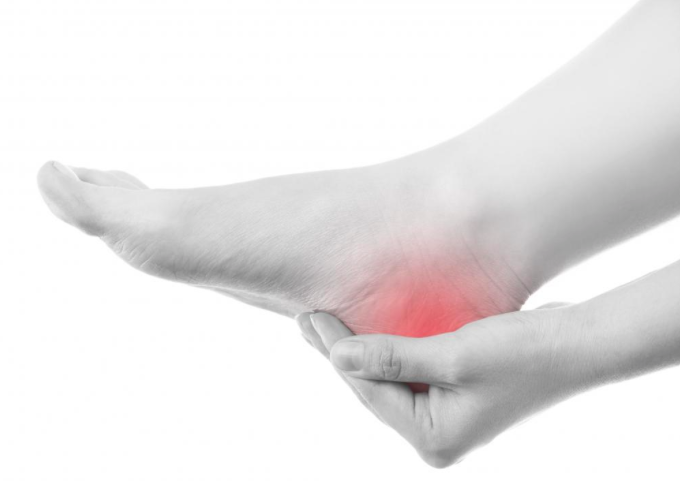
by Tanya Keam | Nov 1, 2019 | Acupuncture, Chinese medicine, Client information, Exercise, Health practitioner, Heel pain, Joint pain, Muscle pain, Nambour, Pain, Plantar Fasciitis, Sunshine coast
Acupuncture for Plantar Fasciitis
Imagine crawling out of bed, half asleep and feeling the pain of standing on a nail or a hot amber right in your heel. You crumble, knees buckle, jaw clenched in pain … this is Plantar Fasciitis! Acupuncture for Plantar Fasciitis.
What is Plantar Fasciitis?
The plantar fascia is a piece of strong and thick tissue that runs along the bottom of the foot. It connects the heel bone to the toes, creating the foot’s arch. Plantar fasciitis is inflammation of the plantar fascia.
It can be caused by:
- Playing certain sports that put stress on the heel bone or recent increased activity
- Flat-footed, high arches or collapsing arches
- Being overweight
- Pregnancy
- Muscle tension in the legs
- Standing for long periods
- Standing on hard surfaces
- Heel spur
- Injury
- Wearing incorrect shoes
- Misalignment of the pelvis or hips
Based on an Australian local population study of 3206 participants, the prevalence of heel pain was 3.6% (1).
What are the symptoms of Plantar Fasciitis?
Pain! Which tends to be aggravated by:
- Long periods of standing or sitting
- When you first step out of bed in the morning and place your feet on the ground
- After increased physical activity in the lower half the body
How do you know if you could be experiencing Plantar Fasciitis?
Because pain is the main debilitating symptom, in most cases diagnosis is by the presenting symptoms and location of pain in the heel. The achilles tendon is also examined for inflammation. Further investigations such as ultrasound or X-ray may be used to rule out other conditions.
How is Plantar Fasciitis treated?
- Pain relief medications
- Steriod injections into the heel
- Activity adjustments or rest
- Appropriate stretching
- Acupuncture therapy
- Massage therapy
- Sole inserts for shoes
- Change in footwear or padding when standing for long periods
- Rest
- Nutritional adjustments
The most effective treatment plan for Plantar Fasciitis is to first remove the cause, then apply stretching and treatment which results in resolving inflammation and pain.
Chinese medicine views of Plantar Fasciitis
Predominantly with the view that there is a stagnation in the flow of Blood and Qi in the affected are, this may also be accompanied by heat in the local area (inflammation). For this condition, a combination of Chinese Medicine practices may be used.
How can Chinese medicine help?
Firstly, figure out the cause, then apply the correct treatment.
Structural alignment of the body – Assessing whether your pelvis/hips or spine is out of alignment determines whether your feet are hitting the ground correctly.
Diet – Modern understanding of gut health has shown poor gut function can significantly increase inflammation in the body. Looking into your nutrition and your eating habits may assist overall health and therefore provide pain relief for issues such as Plantar Fasciitis and also prevent inflammation.
Nutritional supplementation – Foods and herbs can be useful for reducing inflammation. Such as Omega’s, Tumeric and Magnesium.
Acupuncture – Trials have showed potential positive effects in the treatment for Plantar Fasciitis. Acupuncture can be effective at reducing muscle tension and as such can help to reduce the pressure and strain on the fascia in Plantar Fasciitis. Electro-acupuncture coupled with conventional treatments (stretching exercises, shoe modification and analgesics) provided a success rate of 80% in chronic Planar Fasciitis which was more effective than conventional treatments alone (2). Future research should recognise the complexity of plantar heel pain, of acupuncture and of the relationship between them, to explore the optimum use and integration of this approach (3).
Other techniques – massage, cupping, gua sha, liniments to accompany acupuncture.
Lifestyle recommendations – Adjustment of posture, specified stretches, appropriate footwear and prevention about contributing factors that may be aggravating the condition.
If you are suffering from plantar fasciitis or believe you may have something similar such as burning heel pain please contact us today to discuss how we can help you at our Sunshine Coast Acupuncture clinic with your plantar fasciitis or other pain conditions.
 Hi, I’m Tanya, an Acupuncturist and health practitioner in Nambour on the Sunshine Coast, Queensland Australia. I practice Chinese medicine because its safe, logical, relevant and has effectively shown methods of natural wellness for thousands of years (read more about my training here). Life doesn’t need to be complicated and nor does the treatment approaches to get people feeling vibrant and well. I’ve seen people gain a lot from treatments, much more than just alleviating symptoms. It’s exciting to connect with people and share deep wisdom from the classics of ancient and traditional medicine, with modern protocols for todays mind-body living. See you in the clinic !
Hi, I’m Tanya, an Acupuncturist and health practitioner in Nambour on the Sunshine Coast, Queensland Australia. I practice Chinese medicine because its safe, logical, relevant and has effectively shown methods of natural wellness for thousands of years (read more about my training here). Life doesn’t need to be complicated and nor does the treatment approaches to get people feeling vibrant and well. I’ve seen people gain a lot from treatments, much more than just alleviating symptoms. It’s exciting to connect with people and share deep wisdom from the classics of ancient and traditional medicine, with modern protocols for todays mind-body living. See you in the clinic !
References:
- Source- Allan J Pollack, Helena Britt (2015) Plantar fasciitis in Australian general practice Volume 44, No.3, 2015 Pages 90-91, Retrieved from https://www.racgp.org.au/afp/2015/march/plantar-fasciitis-in-australian-general-practice/
- The American Journal of Chinese Medicine, An International Journal of Comparative Medicine East and West. Efficacy of Electro-Acupuncture in Chronic Plantar Fasciitis: A Randomized Controlled Trial. Wipoo Kumnerddee and Nitsara Pattapong. Issue 06, Volume 40, 2012. Retrieved from https://www.worldscientific.com/doi/abs/10.1142/S0192415X12500863
- Clark Richard J, Tighes Maria, The Effectiveness of Acupuncture for Plantar Heel Pain: a systematic review. Acupuncture in Medicine. October 2012. Retrieved from https://journals.sagepub.com/doi/abs/10.1136/acupmed-2012-010183https://journals.sagepub.com/doi/abs/10.1136/acupmed-2012-010183

by Tanya Keam | Aug 5, 2019 | Acupuncture, Chinese medicine, Client information, Emotions, Health practitioner, Herbal remedies, Mental health, Nambour, Rehabilitation, Spiritual growth, Sunshine coast, Wellness
I’ve been having conversations with new and long term Sunshine Coast patients recently about what makes them decide to go see a certain health practitioner over another.
What’s the stats?
- 80% say they’ll ask a friend if they know of someone because they trust that person has had a positive experience
- 10% do a quick google search for who is local and available NOW
- The other 10% just plod on and try to figure it out and hope it all gets better. (I’m sure we’ve all been in each percentage for different things at different times).
Last week a semi-new patient returned for a monthly appointment. She was telling me about her 2 colleagues at work who also suffered migraines (which was this patients main complaint that’s now been resolved from treatment). One of the colleagues was just at her wits end with constant migraines, not knowing where to turn that she is now taking stress leave from work. Hallelujah for proper rest! However, please, if you have good results with any local Sunshine Coast health businesses in all fields – TELL YOUR FRIENDS AND HELP THEM OUT!
My top tips for choosing the right health practitioner
- Someone close to you goes to them and has had a positive experience.
- The practitioners appointment availability fits your schedule (there’s no point trying to see an ‘amazing practitioner’ referral who isn’t available on a specific day that you need/prefer.
- The practitioner is honest about whether they can help you, is willing to research how they can help you or can find you the right referral if they can’t help you.
- What are your needs that need to be met? Are you looking for a quick fix or someone to guide to you wellness with the treatment that suits you as an individual and also teaches you lifestyle adjustments for preventative health.
- The practitioner is qualified and experienced in their field, holds current insurances and certificates for their modality and does continuing education each year.
- The practitioner explains the treatment clearly to you (if it’s new to you), how it works, how long your condition may take to resolve and even reactions that can occur as your body tries to heal and adjust.
- You have a friendly connection and can hold a good conversation with your practitioner – this may happen down the track but it is important to connect.
- For eg. You may see an Acupuncturist to help manage anxiety (there is good scientific evidence encouraging acupuncture therapy to treat anxiety disorders as it yields effective outcomes, with fewer side effects than conventional treatment). However, you are needing psychology/counselling support to talk to someone in a therapeutic way. It is the practitioners duty of care to practice within their scope of practice and find someone who can assist in that area of your health.
- Ask your other health related modalities if they know of someone – your pilates teacher may know a good counsellor, your naturopath may know a good GP. *Not only should health practitioners take care of themselves, but they invest time and energy to source local health referrals to connect with.
If you’re unsure about going to someone new :
- Research
- Know what they specialise in
- Their experience
- Training and credentials
- Appointment availability.
- Most importantly, call them and talk to them or ask if you can meet them in person prior to making an appointment.
We need to make some failures before we find the right fit sometimes. Don’t sweat it if a ‘great referral’ doesn’t feel right you for – just find someone else. Persist! Your health is your life.
Your local community are there to support you so ask your friends and colleagues for recommendations. If you’re unsure about continuing care with a practitioner, communicate with them about what is and isn’t working. They should be able to change the treatment approach, make some suggestions and respect what you want to do.
Newcomers to Chinese Medicine and Acupuncture have A LOT of questions – feel free to share this info here.
For more information about how I can help with your health, you can contact me
or you can now book online
 Hi, I’m Tanya, an Acupuncturist and health practitioner in Nambour on the Sunshine Coast, Queensland Australia. I practice Chinese medicine because its safe, logical, relevant and has effectively shown methods of natural wellness for thousands of years (read more about my training here). Life doesn’t need to be complicated and nor does the treatment approaches to get people feeling vibrant and well. I’ve seen people gain a lot from treatments, much more than just alleviating symptoms. It’s exciting to connect with people and share deep wisdom from the classics of ancient and traditional medicine, with modern protocols for todays mind-body living. See you in the clinic !
Hi, I’m Tanya, an Acupuncturist and health practitioner in Nambour on the Sunshine Coast, Queensland Australia. I practice Chinese medicine because its safe, logical, relevant and has effectively shown methods of natural wellness for thousands of years (read more about my training here). Life doesn’t need to be complicated and nor does the treatment approaches to get people feeling vibrant and well. I’ve seen people gain a lot from treatments, much more than just alleviating symptoms. It’s exciting to connect with people and share deep wisdom from the classics of ancient and traditional medicine, with modern protocols for todays mind-body living. See you in the clinic !
Research:
Amorim D, Amado J, Brito I, Fiuza SM, Amorim N, Costeira C, Machado J. Acupuncture and electroacupuncture for anxiety disorders: A systematic review of the clinical research, Complementary Therapies in Clinical Practice, 2018 May;31:31-37.

 anya, an AHPRA registered Acupuncturist and health practitioner in Nambour in the Sunshine Coast hinterland, Queensland Australia. I practice Chinese medicine because its safe, logical, relevant and has effectively shown methods of natural wellness for thousands of years (read more about my training here). Life doesn’t need to be complicated and nor does the treatment approaches to get people feeling vibrant and well. I’ve seen people gain a lot from treatments, much more than just alleviating symptoms. It’s exciting to connect with people and share deep wisdom from the classics of ancient and traditional medicine, with modern protocols for todays mind-body living. See you in the clinic !
anya, an AHPRA registered Acupuncturist and health practitioner in Nambour in the Sunshine Coast hinterland, Queensland Australia. I practice Chinese medicine because its safe, logical, relevant and has effectively shown methods of natural wellness for thousands of years (read more about my training here). Life doesn’t need to be complicated and nor does the treatment approaches to get people feeling vibrant and well. I’ve seen people gain a lot from treatments, much more than just alleviating symptoms. It’s exciting to connect with people and share deep wisdom from the classics of ancient and traditional medicine, with modern protocols for todays mind-body living. See you in the clinic ! 







